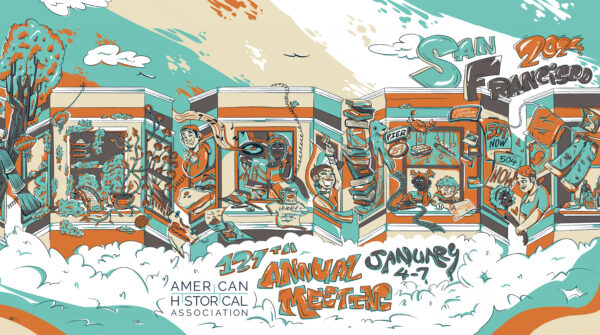One reason to love the AHA annual meeting is that it features sessions from every subfield in the discipline. This means that most of us can find presentations on our specific research interests, as we would at smaller, more field-specific meetings, but we can also learn from specialists who focus on other times and places. This is particularly useful for teaching, since global history courses are a staple of nearly every high school and college curriculum, and learning about the latest research in various subfields is a good way to add new insights and themes to a survey class. At the same time, we all benefit intellectually from getting out of our comfort zones and discovering what the practice of history looks like from an unfamiliar vantage point.

This January, we are happy to feature a number of sessions related to Asian and global history. Some focus on specific times and places and some are explicitly comparative, but in most of them the goal is to understand historical phenomena—war, capitalism, care work, sexuality—from a multitude of geographical and temporal perspectives. Every time slot on the program features at least one session that connects Asia and the world. This seems particularly appropriate for a meeting in San Francisco, a city with a rich history of exchange across the Pacific. A few of these sessions are listed below, but you can find many more of them by perusing the program.
On Thursday, January 4, 2024, Rethinking the Development of Capitalism in Japan (1:30 p.m., Hilton Franciscan A) showcases new work from emerging scholars. It assesses how the economic history of the first non-Western country to industrialize might transform our understanding of the origins and consequences of capitalism. Next, Big Asia: A Roundtable on Border Crossing (3:30 p.m., Hilton Continental Ballroom 5) features a conversation between historians of Japan, China, Southeast Asia, and South Asia who work on unconventionally large units of analysis. Positioned at the cutting edge of transimperial, translocal, and borderland histories, these historians will discuss the potential of “thinking big” about an already enormous region of the world.
On Friday, January 5, two panels in the morning ask how the “medieval” might be reconceptualized from an Asian perspective. Rethinking the “Medieval” in South Asian History (8:30 a.m., Hilton Continental Ballroom 3) is a panel discussing new research on the Indian subcontinent, and Teaching against Modern Myths (10:30 a.m., Hilton Imperial B) investigates new approaches to pedagogy about premodern Japan, which often elicits assumptions about heroic samurai and an unchanging, exotic past. In the afternoon, at Writing History of and through Children in Modern East Asia (1:30 p.m., Hilton Continental Ballroom 1), panelists will present research that examines how an East Asian focus might productively trouble methodological debates that still mainly focus on European and American categories of “childhood,” while in State of the Field for Busy Teachers: Pacific Rim History (1:30 p.m., Hilton Continental Ballroom 6), panelists discuss new developments in scholarship with the aim of engaging educators looking for fresh materials and approaches. In Mobility in the Transimperial/Transcolonial Landscape of Modern Asia (3:30 p.m., Parc 55 Mission I), historians consider the movements of Indigenous people, refugees, and entrepreneurs through and across imperial spaces.
On Saturday, January 6, The Johnson–Reed Act 100 Years Later (8:30 a.m., Parc 55 Cyril Magnin I) examines connections and disconnections between Asia and the United States as it reflects on the 100th anniversary of the infamous law that completely excluded Asians and restricted the flow of other “new” immigrants to the United States. At the same time, Daily Life in 20th-Century China (8:30 a.m., Hilton Franciscan B) offers new research on opera, consumer culture, hygienic instruction, and literacy training for women. World War II’s Global Turn (10:30 a.m., Hilton Continental Ballroom 5) is a roundtable that reassesses the conflict as a “great imperial war” that engendered liberation struggles on the part of colonized people across the globe. Global Mobility and New Knowledge (1:30 p.m., Parc 55 Cyril Magnin III) examines early modern cross-cultural communication between East Asia and Europe, and Rethinking Legal Pluralism (3:30 p.m., Hilton Franciscan C) considers the diversity of legal institutions and practices in Qing and Republican China.
Finally, on Sunday, January 7, you can wake up early for New Approaches to the History of Sexuality in East Asia (9:00 a.m., Hilton Continental Ballroom 7), a roundtable addressing a subject that has a rich scholarly history but that is often considered taboo or unspeakable in the current academic climate in the region and elsewhere. Finally, Local History Is Global History (11:00 a.m., Hilton Golden Gate 5) is a teaching practicum where participants will work through approaches to connecting global and local history in secondary classrooms, using materials from Kuliang, Fuzhou, and Los Angeles, California, as case studies.
These are only some of the dozens of presentations and sessions related to Asian and global history, so whether you are a specialist in the region’s history or a newcomer looking to expand your knowledge, the AHA annual meeting offers something for you.
Amy Stanley is Wayne V. Jones II Research Professor in History at Northwestern University and chair of the 2024 Program Committee.
This work is licensed under a Creative Commons Attribution-NonCommercial-NoDerivatives 4.0 International License. Attribution must provide author name, article title, Perspectives on History, date of publication, and a link to this page. This license applies only to the article, not to text or images used here by permission.


